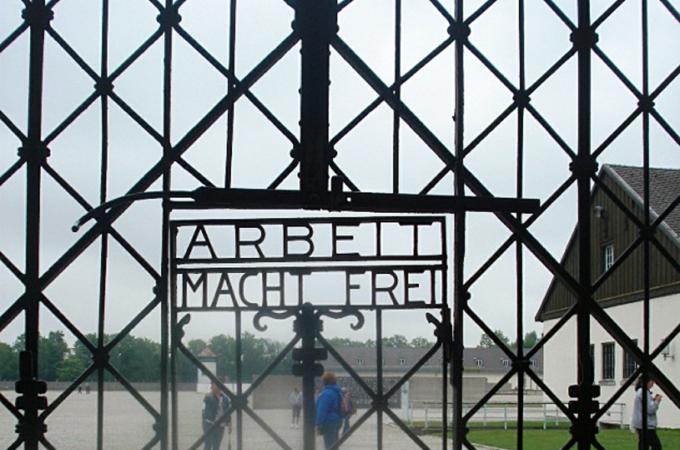'Work sets you free'
''Arbeit Macht Frei" are the words that are forged into the gates of Dachau, the former concentration camp in Southern Germany that held over 4,000 priests during the terrorizing reign of the Third Reich. These words are translated into English as "Work sets you free." It was through this gate that Jesuit Father Otto Pies left and it was through this gate that he returned disguised as a SS guard with a load of food hidden in the back of his truck.
In an article published in American magazine, Father William O'Malley describes how Father Pies drove into the section reserved for Catholic priests and, after unloading the food, drove out of the camp with 30 priests hidden in the back of his truck. Father Otto brought those priests to freedom and headed back to Dachau with the hope of saving more priests. Two days later as American troops were advancing to liberate the camp, German troops led thousands of prisoners including nearly 100 priests into the Alps where they perished.
According to Father O'Malley, Father Otto Pies was one of thousands of priests imprisoned at Dachau, a concentration camp used primarily for prisoners thought to be a political or intellectual threat to the Third Reich. These priests served with heroic virtue ministering to the physical, emotional, and spiritual needs of the prisoners encamped with them. Towards the end of the war, many priests were moved into secretarial positions at the camp where they were able to secretly change work details to alleviate human suffering. Other priests, forced to work in hospital administration, took advantage of their situation by secretly caring for the sick. Still others took advantage by delaying the construction of a crematorium, which by their efforts was never completed. In the middle of great evil, profound love was incarnated by the tender compassion and self-sacrifice of the priests of Dachau.
From behind the barbed wire and the bottom of empty bowls of Dachau, a revolution of tenderness was rising that would not only change the face of ordained ministry, but would change the face of the Church in the modern world through the restoration of the diaconate as a permanent ministry of the Church. Imprisoned at Dachau, Father Otto Pies and another priest, Father Wilhelm Schamoni, began clandestine talks about the need to have a permanent and sacramental reminder of Christ the Servant. Faced with the brutal capacity for evil, these priests not only mediated a divine response to evil, they envisioned the restoration of a divine ministry of mercy, compassion, and love -- diakonia. Their discussions were preserved in the concentration camp notes of Father Schamoni and, with their publication after the war their idea to restore the diaconate gained momentum. These priests of Dachau were calling the Church to recover her fundamental identity as an image and icon of Christ who stands in the midst of a troubled and brutal world as a servant.
It is into this world that our eternal Father sends his only begotten son. It is into this world that Jesus sends his disciples equipped with a towel around their waist to wash another's feet as an example of God's mercy -- a mercy that unbinds, frees, heals, and saves. Each baptized Christian is sent to make present anew the work, the ministry, the servanthood, and diakonia of Jesus Christ.
Though the words "Work sets you free" met those who came into the prison camp, the great irony before those who built that gate at Dachau is that the work that truly sets every person free is diakonia. The deacon is ordained, not into the priesthood of Christ, but unto the ministry that binds wounds and heals hearts. Yet the deacon is ordained, not for his own holiness, but to animate the work and ministry that is common to everyone who is made new by the waters of Baptism. By our common diakonia, the love of Jesus Christ within our hearts becomes concrete action that leads to a revolution of tenderness -- true and lasting freedom for each person in need that we encounter in our family, our parish, and our community.
DEACON CHRISTOPHER CONNELLY IS THE DIRECTOR OF FORMATION FOR THE PERMANENT DIACONATE. THIS COLUMN IS PART OF SERIES COMMEMORATING THE 50TH ANNIVERSARY OF THE RESTORATION OF THE PERMANENT DIACONATE IN THE U.S., 1968-2018.



















